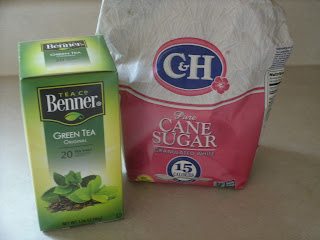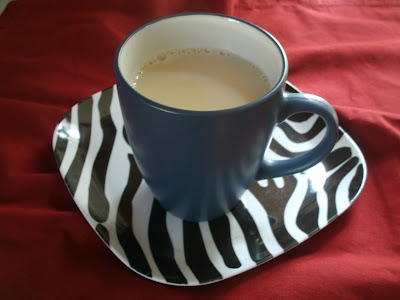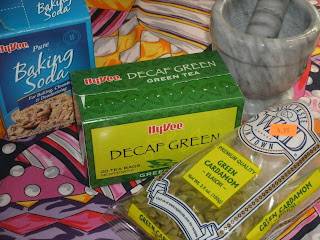Local tea
There were several countries where the only references I found to tea were "mountain tea", or tea made from local herbs. Further search said they were using the iron wort plant, but I haven't found a local source for that. Thus, I decided to make tea from a plan that grows locally in their honor.
I recently made a trip to the local Indian food store to stock up on spices again. I was really excited to find whole turmeric dried. Now I can brew that up with my whole, dried ginger for tea whenever I want instead of searching for fresh turmeric or making sachets of dried herbs out of coffee filters.

However, that particular herb is not the focus of today's post. I was intrigued by the bag of dried mint leaves just because I hadn't remembered seeing them before. As you may recall, I had a mint plant a couple of summers ago, so I decided to give this mint a try. At the end of the season for my mint plant, I tried drying the leaves for later use, but they had absolutely no flavor.
The leaves are certainly in small pieces, but they smell very nice. Having a minty scent is a good sign. I recall thinking that the mint I dried didn't have much of a scent as soon as it dried out. Trying to use it for tea or cooking was a complete flop. It didn't taste like anything.
The finished cup has a nice color, and smells like mint. That's a good sign. Upon sampling, I found that it does actually taste like mint, too. Now I can formulate my own Moroccan mint tea, or just drink straight up mint tea in the evenings. Thank you local Indian food store!
Albania is in southern Europe on the Baltic peninsula bordering the Adriatic sea. The most I learned about Albania as a kid came from pop culture, which I don't think is all that accurate. I'm not sure how accurate this depiction is. They were a communist state at the end of WWII, and that ruling system started to break up in 1989. Now they are a parliamentary democracy. The landscape looks very lovely with a mountainous interior plunging down to a coastal plane. It explains why they make "mountain tea".
Greece, bordering Albania to the south also makes "mountain tea", and there is apparently some controversy over whether or not people stay on their side of the border when gathering their herbs. Greece is comprised of around 2000 islands, of which 170 are populated, and a mainland on the southern tip of the Baltic peninsula. It is a land known for volcanoes, earthquakes, history, and its ancient architecture.
Estonia is the outlier in this group, being located in northern Europe by Latvia and Russia. After leaving the U.S.S.R. in 1991, they became a parliamentary democracy like Albania eventually became. Their country is described as having a landscape formed by glaciers marked by moraine hills, and elongated hills with flat tops. Thanks to their position on the Baltic sea, the winters are warmer, and the summers are cooler than most of their neighboring countries. Given the fact that the climate is favorable for agriculture, it makes sense that people would forage for local herbs to make their tea.
I recently made a trip to the local Indian food store to stock up on spices again. I was really excited to find whole turmeric dried. Now I can brew that up with my whole, dried ginger for tea whenever I want instead of searching for fresh turmeric or making sachets of dried herbs out of coffee filters.

However, that particular herb is not the focus of today's post. I was intrigued by the bag of dried mint leaves just because I hadn't remembered seeing them before. As you may recall, I had a mint plant a couple of summers ago, so I decided to give this mint a try. At the end of the season for my mint plant, I tried drying the leaves for later use, but they had absolutely no flavor.
The leaves are certainly in small pieces, but they smell very nice. Having a minty scent is a good sign. I recall thinking that the mint I dried didn't have much of a scent as soon as it dried out. Trying to use it for tea or cooking was a complete flop. It didn't taste like anything.
The finished cup has a nice color, and smells like mint. That's a good sign. Upon sampling, I found that it does actually taste like mint, too. Now I can formulate my own Moroccan mint tea, or just drink straight up mint tea in the evenings. Thank you local Indian food store!
Albania is in southern Europe on the Baltic peninsula bordering the Adriatic sea. The most I learned about Albania as a kid came from pop culture, which I don't think is all that accurate. I'm not sure how accurate this depiction is. They were a communist state at the end of WWII, and that ruling system started to break up in 1989. Now they are a parliamentary democracy. The landscape looks very lovely with a mountainous interior plunging down to a coastal plane. It explains why they make "mountain tea".
Greece, bordering Albania to the south also makes "mountain tea", and there is apparently some controversy over whether or not people stay on their side of the border when gathering their herbs. Greece is comprised of around 2000 islands, of which 170 are populated, and a mainland on the southern tip of the Baltic peninsula. It is a land known for volcanoes, earthquakes, history, and its ancient architecture.
Estonia is the outlier in this group, being located in northern Europe by Latvia and Russia. After leaving the U.S.S.R. in 1991, they became a parliamentary democracy like Albania eventually became. Their country is described as having a landscape formed by glaciers marked by moraine hills, and elongated hills with flat tops. Thanks to their position on the Baltic sea, the winters are warmer, and the summers are cooler than most of their neighboring countries. Given the fact that the climate is favorable for agriculture, it makes sense that people would forage for local herbs to make their tea.






I'm glad you found a good source of mint.
ReplyDeleteI was quite surprised myself. I figured it wasn't a huge investment to try it and see.
Delete